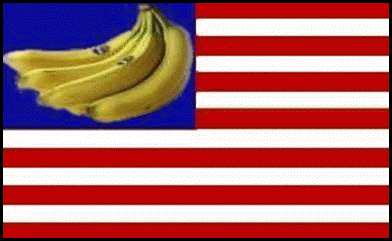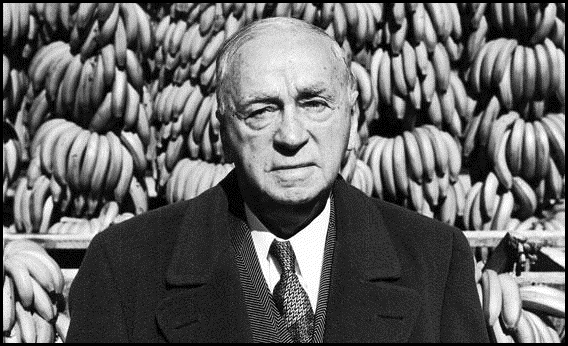The Life and Times of America's Banana King
Rich Cohen
Farrar, Straus and Giroux

- According to another legend, the banana was the holy fruit from the East, sustenance for the wise men of India, the peels rotting in piles beside the bodhi tree where the Buddha attains enlightenment.
Some claim that in the jungle, after a rain, "you can hear the banana trees growing." But the banana doesn't grow on a tree. It's an herb, classed as a berry, "the world's tallest grass ... the largest plant in the world without a woody trunk." Cohen compares the stem to a "roll of dollar bills."
- The plant grows from a rhizome, which, in the way of a potato, has no roots.
If you cut one down, and cut it into a pieces, and bury the pieces, new banana 'trees' will erupt from the ground.
Most winters, I live on a banana plantation near the equator. I use the word "plantation" as a show off ---- because there are only about forty banana plants (or were, before the last hurricane). The fronds move nicely in the breeze, and in a place where the sun can be hurtful, they provide a spacious, constantly agitated shade.
When a bunch of bananas erupts (suddenly!) the plants will double over in agony at the weight of their new babies. At that time, Juan will hack off the bananas and set them aside to ripen (plastic bag, sealed, with half an apple inside). He will then cut off the rest of the plant down low, at the diagonal. Within a couple of weeks, we have a clone, taller than me.
The plants also carry another dividend. There is a yellow wasp as long as my thumb that feeds on the nectars produced by the flowering and fruiting plants. They like us, these avispas, like joining us for lunch, want to feed on our bread and salad and beans and tortillas. Last year one got in my plate and I slapped him and the son-of-a-bitch stung me smartly on the thumb which promptly doubled in size and gave me a restless night of fever and cursing the bichos (and bananas) of Oaxaca.
The politics of bananas is the heart of The Fish That Ate the Whale. It all comes from the fact that bananas don't and won't grow in the United States --- their biggest market --- but, instead prosper in Honduras, Guatemala, Mexico, El Salvador, Nicaragua, Panama and Columbia. The politics of that area have come, over the years, to be married to the politics of the United Fruit Company.
When UF first got into the business 150 years ago, bananas were a luxury: a small slice sold for 10¢ at the World Exposition of 1876 in Philadelphia. United Fruit --- then known as Boston Fruit --- colonized Central America and promptly colonized the banana, spent years ramping up our desire for this funny curved yellow sickle ... which is kind enough to carry its own protective packaging.
The Fish That Ate the Whale is the story (and it is a fascinating story) about how the banana took over America, and how one man, a Jewish immigrant from Russia, Samuel Zemurray, became the banana king.
